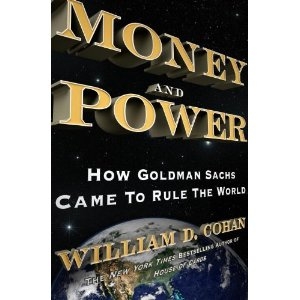 Goldman Sachs has been around for 142-years. It has maintained an image of being better than its competitors — smarter, more collegial, more ethical, and far more profitable. Its “14 Principles” starts with “Our clients’ interests always come first.” (Cue laughter; cut to SEC settlement)
Goldman Sachs has been around for 142-years. It has maintained an image of being better than its competitors — smarter, more collegial, more ethical, and far more profitable. Its “14 Principles” starts with “Our clients’ interests always come first.” (Cue laughter; cut to SEC settlement)
William D. Cohan’s Money and Power: How Goldman Sachs Came to Rule the World reveals what utter nonsense that story is. The faux narrative is the result of the most aggressive and sophisticated PR machine in the financial industry. Goldman is a secretive money-making machine, rife with conflict of interests, exerting undue influence over government.
When the firm is not busy doing “God’s work,” it is assiduously cultivating people in power. Its been that way since 1913, when Henry Goldman advised the government on how the new Federal Reserve, designed to oversee Wall Street, should be constituted. Sidney Weinberg, who ran the firm for four decades, advised presidents from Roosevelt to Kennedy and was nicknamed “The Politician” for his behind-the-scenes friendships with government officials. Goldman executives ran fundraising efforts for Nixon, Reagan, Clinton and George W. Bush. Famously, and fatefully, two Goldman leaders — Robert Rubin and Henry Paulson — became Secretaries of the Treasury, where their actions both before and during the financial crisis of 2008 became the stuff of controversy and conspiracy theories.
Reviews:
“[A] definitve account of the most profitable and influential investment bank of the modern era….recounts these events capably…..[and explains] Goldman’s cultivation of a reputation for brilliance unique even in the rarefied precincts of Wall Street…..gives readers the information they need to ponder whether investment banking has moved in a constructive direction.”
–New York Times Book Review~~~
“Destined to be a runaway bestseller…There’s no shortage of Goldman clients, rivals, and former employees willing to explain how greed and recklessness led Goldman to become too big, too powerful, and even too conflicted to fail. As one Goldman alum puts it, ‘I saw what they did to their customers…They’d steal from them, rape them, anything they could do.’ It worked like a charm…[Cohan] has produced the frankest, most detailed, most human assessment of the bank to date. Cohan portrays a firm that has grown so large and hungry that it’s no longer long-term greedy but short-term vicious. And that’s the wonder — and horror — of Goldman Sachs.”
–Businessweek~~~
“A well-researched history and analysis of the world’s most powerful investment bank. Written with the co-operation of the top people at Goldman, Cohan’s book is neither a hatchet-job nor a whitewash – and all the better for that.”
–Financial Times~~~
“[Money and Power] offers the best analysis yet of Goldman’s increasingly tangled web of conflicts…The writing is crisp and the research meticulous, drawing on reams of documents made publicly available by congressional committees and the Financial Crisis Inquiry Commission.”
–The Economist~~~
“[E]xhaustive, revelatory account of the rise and rise of Goldman Sachs….engrossing….penetrating….Cohan revels in a good bust-up and lingers over anecdotes involving intrigue….All the senior partners still living spoke to him, often very candidly, and only a few from the next ranks seem to have refuse….a vast trove of material”
–Financial Times~~~
“A former Lazard Freres & Co. banker and newspaper reporter, Cohan brings the bank’s sometimes ‘schizophrenic’ behavior to vivid life…Drawing on more than 100 interviews with clients, competitors and Goldman leaders including Chief Executive Officer Lloyd C. Blankfein, Cohan evinces an eye for telling images and an ear for deadpan quotations.”
–Bloomberg~~~
“In MONEY & POWER, journalist and former investment banker William D. Cohan launches a quixotic quest to show that Mr. Blankfein and his peers are money-sucking evil-doers that came to their riches mostly by nefarious means…Mr. Cohan’s complaints against Goldman seem to be that it is ‘ruthless’ in pursuit of profit; doesn’t do enough to protect its instutitional clients from making bad decisions; works too closely with government; too often advises clients on both sides of a deal; and skirts close to the line of ‘insider trading’.”
–The Wall Street Journal
~~~
Full chapter after the jump


What's been said:
Discussions found on the web: